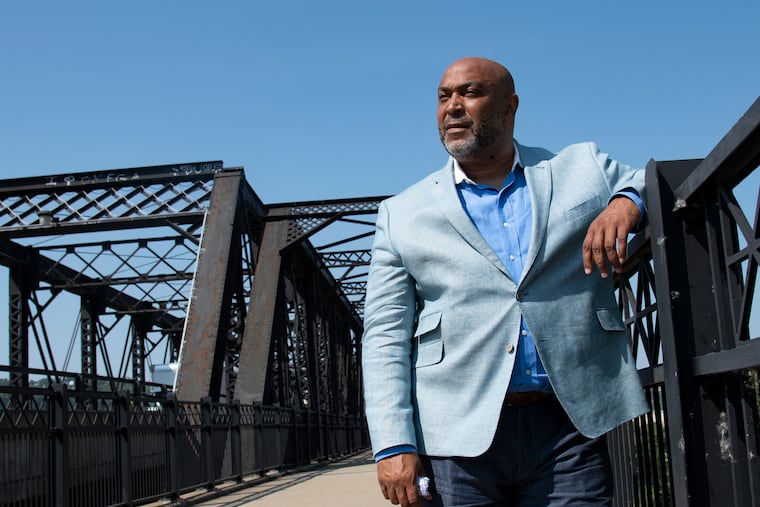Philly’s jazz musicians have a new leader looking out for them as COVID-19 rages
"Losing the people that we’ve lost already is devastating," says new Jazz Bridge executive director Joseph L. Lewis III.

The COVID-19 pandemic hit the local jazz community hard this spring with the deaths of Philadelphia-connected musicians Bootsie Barnes, Henry Grimes, and Wallace Roney. And with clubs closed and the disease still in circulation, musicians continue to face the risk of illness and economic hardship.
That’s the challenge for Joseph L. Lewis III, a former Philadelphia Tribune reporter and current TV producer, as he steps into his role as the executive director for the musician-founded aid society Jazz Bridge.
Jazz Bridge, founded in 2004 by singers Suzanne Cloud and Wendy Simon, provides money and other support to Philadelphia-area jazz and blues musicians who are in crisis — medically, financially, or otherwise.
Though the organization is largely funded through donations and grants, it also raises funds with its annual Neighborhood Concert Series, traditionally performed October through May, and has a reputation as a presenter of stellar live music. The coronavirus pandemic threatens this revenue stream, even as the need for aid grows.
Lewis is the third person to head Jazz Bridge, following Cloud’s retirement and the yearlong tenure of WRTI DJ Jeff Duperon, who passed away in June 2019.
An award-winning producer, Lewis has helped create documentaries on jazz figures like Dizzy Gillespie and Ella Fitzgerald. He lived in Philadelphia for 20 years after graduating from Pittsburgh’s Duquesne University, before moving back to Pittsburgh to produce a PBS TV show and care for his mother.
He’s also worked in advertising and marketing for nonprofits and creative enterprises including the YMCA of Philadelphia, Camden’s Walt Whitman Cultural Arts Center, the Pittsburgh Cultural Trust, and Pittsburgh’s August Wilson African American Cultural Center.
He plans to move back to the Philadelphia area in August. He spoke with The Inquirer by phone last week.
» READ MORE: Philadelphia jazz great John Coltrane’s house ‘at risk,’ preservationists say
How did you initially become interested in jazz?
First, I grew up hearing my father’s jazz albums. Wes Montgomery was the first person that impacted me. Then it was Miles Davis.
But I’m 55, and growing up in the ’70s you would encounter jazz musicians on TV. There were variety shows back then, so you would see Duke Ellington on Flip Wilson or Dizzy Gillespie on Mike Douglas. You’d see jazz musicians on Dick Cavett. I gravitated to their style, their intellect, their cool.
Then once I moved to Philadelphia after college, jazz was the fodder of the intellectual set. In Philadelphia, there was always talk of John Coltrane, Charles Earland, Trudy Pitts, and Mr. C. Then Zanzibar Blue [the now-defunct Broad Street jazz club] opened up around that time as well. That was my journey.
What interested you in taking on the executive director role at Jazz Bridge?
I thought it was a great opportunity because what’s better than trying to help people? The mission of the organization is to help jazz musicians in crisis, and I felt that it was an opportunity to broaden its footprint.
What is your vision for the future of the organization?
Jazz Bridge is already critical to the jazz musicians that we’ve helped along the way these last 16 years. I’d just like for it to be a larger organization. We can expand and provide greater services for the musicians. Maybe we can talk about helping them with housing further down the line.
Right now we’re just helping them while they’re in crisis — we’re very reactionary. I’d like to be more preventative and think more long term.
» READ MORE: 5 Philly jazz sites besides the Coltrane House that need historical preservation | Opinion
What are the challenges you face taking on this role during a pandemic?
It’s daunting, in a word. Given that we have no control over the virus and it seems like we’re going backwards right now, that’s a hard question to answer. Losing the people that we’ve lost already is devastating.
These are also interesting times from a cultural and racial standpoint, which puts an internal mirror on us as a culture and as a country. It’s great to get an opportunity to have a voice as people stand up and try to change things.
A major part of Jazz Bridge’s mission is its Neighborhood Concert Series. Will that continue in some form during quarantine?
We had to truncate our concert series last season, which cost us 30% of our revenue. We’re very seriously considering doing some online broadcasts once we redesign our website. Our goal — our hope — is to start in October. That’s my first priority right now.
I handle the marketing and advertising for the Pittsburgh International Jazz Festival, and in lieu of doing the festival this year we did a seven-hour broadcast blending new performances with archival footage. It was great for me to have that experience, to figure out the kinks and the pitfalls that might happen with an online broadcast.
» READ MORE: Philly jazz legend Archie Shepp and his rapper nephew Raw Poetic have a new cross-generation project
You seem to be looking forward to the challenge.
What am I going to do, twiddle my thumbs during a pandemic? It’s been three months. I’m tired of sitting around. I want to be involved.